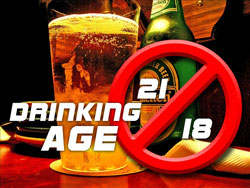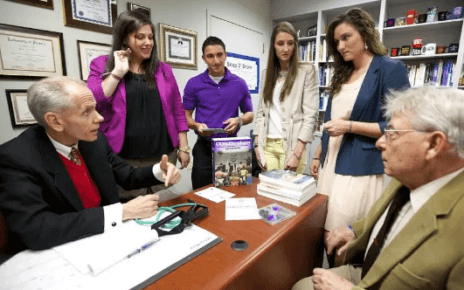New Jersey Assemblyman Michael Patrick Carroll has introduced legislation that would lower the legal drinking age from 21 years old to 18 years old.
Carroll argues that it is wrong for an 18 year old American can join the military but cannot consume an alcoholic drink.
Similar efforts to lower the drinking age in NJ have been brought to Trenton since then but haven’t been considered because of the fear of losing federal money. It is unlikely that the bill will pass in the NJ State Legislator due to the federal law that any state that reduces its drinking age below 21 would lose millions of dollars in federal highway funds.
Bill McElrath, Chief of Monmouth University Police Department (MUPD), explained the effect the law would have on University campuses.
“I think it could significantly increase the amount of drinking taking place both on and off campus, with all the negative consequences associated with the abuse of alcohol,” said McElrath. “I feel that the younger one is, the less capable he is to make the proper decisions regarding alcohol use,” he added.
“I also think that having more people drinking will only make for more alcohol related tragedies and arrests. Lastly, I would be concerned that lowering the age will only lead to shift the underage drinking problem from the 18-20 year old range to the 16-17 year old range,” McElrath said.
Dr. Janice Stapley, an associate professor of psychology, believes that if the legislation is passed, it will increase the amount of driving while intoxicated in NJ. “[It is] especially dangerous when it differs in contiguous states and kids drive across state lines to drink,” she said.
McElrath believes that the volume of people that would be drinking under this legislation would cause more alcohol related tragedies and arrests. He also said that lowering the drinking age would affect younger teenagers as well. “I would be concerned that lowering the age will only lead to shift the underage drinking problem from the 18-20 year old range to the 16-17 year old range,” McElrath said.
Dr. Dennis Rhoads, professor of biology, said that the National Institutes of Health suggests that 95 percent of people who struggle with alcoholism began drinking regularly in their teens. “There is a well-publicized correlation between the age that someone begins drinking regularly and lifelong problems with alcohol abuse. It is important to recognize that the brain goes through many changes through adolescence and into at least the early twenties,” said Rhoads.
Rhoads said that quitting at once can be harmful to the body as well. “A gene, for example, that affects alcohol metabolism by the liver could be defective so that even a small amount of alcohol results in toxic build-up of the alcohol metabolite acetaldehyde which among other things causes headache and nausea,” he said.
Stapely added that the health effects of alcohol are more severe for younger consumers. She said that the neurological evidence proves that alcohol is processed differently and is more dangerous for adolescents than adults.
What makes younger consumers more susceptible to alcoholism may lie in their genetics, according to Rhoads. He said, “A certain gene might make someone more susceptible to anxiety disorders and alcohol will reduce anxiety (it is a so-called anxiolytic agent). Therefore, individuals with at least some anxiety disorders are more prone to abuse alcohol.”
However, anxiety may also result when one stops consuming alcohol if they are regular drinkers. “Whereas alcohol is a depressant as far as brain activity, the adaptive changes in the brain followed by removing alcohol leads to heightened anxiety and brain hyperactivity even seizures,” said Rhoads. “Some people may be genetically more susceptible to these changes but they occur to some extent in anyone drinking alcohol regularly.”
Charlie Regn, bartender and mixologist at R-Mixology and Catering, said that he is in favor of lowering the drinking age because of the “taboo-culture that has sprung up around drinking, making it subversive and therefore abused by young people.”
Regn added, “The current drinking age does little to stop young people from drinking, and that if they were able to do so in a social setting that might help them make better choices and be supervised by bar personnel.”
Dr. Covino, professor of psychology, said that the appeal of alcohol is stronger for young adults. He said that adolescent drinking is influenced by many things, such as biology, genetics, mental health, culture, learning, and social factors. Family drinking behavior and peer drinking patterns can be powerful inducers of alcohol consumption as well.
Covino added, “And for the socially anxious adolescent, the use of alcohol can be self-medicating to reduce symptoms of awkwardness and anxiety, so it becomes associated with a positive outcome and can become a habit into adulthood. Drinking often starts in adolescent via peer pressure to conform or fit in, and then continues.”
Regn said that the current age restrictions for drinking in NJ may cause upsets in a young person’s professional goals. “These underage drinking restrictions can be hefty penalties which can reflect poorly on the young person’s future. We should be making life easier for young people not harder.”
An anonymous student said that he has consumed alcohol underage, but took extra safety measures. “I have participated and drank with others underage. When this occurred we had a ton of precautions. You had to sleep over to drink being the main one,” he said.
The same student added, “Most countries other than the US have drinking ages lower than 21 and these countries seem to have lower rates of underage drinking. I feel as though lowering the age would take away a lot of the appeal for underage drinking.”
Drinking at a young age is also dangerous because the brain is still developing into a person’s mid-twenties, according to Covino. “The implication is that under age 25, the parts of the brain that control impulses and risky behaviors are still underdeveloped. This is the reason teens and young adults have the highest incidence of motor vehicle accidents and fatalities from other impulsive behaviors. Add alcohol to this mix and you got trouble,” she said.
Covino also said that early exposure to alcohol can become a medium for self-medication and is habit-forming. “Not everyone becomes alcohol-dependent who consumes alcohol, but accessibility and opportunity are relevant and compelling factors in any kind of addiction,” she said.
Regn said that if the drinking age were lowered, he would still be apprehensive when serving those under 21. “I do not serve to anyone underage, but if laws were changed I would approach younger people with more of a nurturing attitude. Currently when serving to 21 year olds I try to suggest cocktails and other alcoholic beverages that are lower ABV (alcohol by volume) and not overly sweet so they nurse the drink and don’t wind up ordering too much by the end of the night,” he said.
Covino added that people who begin drinking at a younger age are more likely to develop alcoholism. “We know that there is a strong genetic component to alcohol abuse, but other complex factors and socio-emotional trajectories have also been identified for the development of alcoholism,” said Covino. “However, drinking or abusing substances at a young age has consistently been found to be the common denominator in people diagnosed with substance abuse disorders later in life.”
Stapely said that the effects of alcohol are more dangerous for underage drinkers because they are more likely to become addicted, have a less sedative response than adults, meaning that they don’t get tired, and it will cause more memory impairment, which is especially bad for students.
Rhoads explained some other factors that make drinking at a young age more dangerous for a consumer’s health. “Research over the last 20 years has shown that the adolescent brain is hard wired for binge drinking. Adolescents are less sensitive to becoming sleepy when consuming alcohol and less sensitive to lack of coordination (stumbling around, falling down) associated with alcohol intoxication,” he said. These affects have been described as cues to know when to stop drinking.
While the reaction to this legislation is negative overall, McElrath explains a positive effect. “It could be regulated which would mean that much of the underage drinking that is now taking place in unregulated and unsafe locations such as crowded basements, remote locations and vehicles, would be lessened.”
IMAGE TAKEN from hibiscuscoastseconds.co.za




